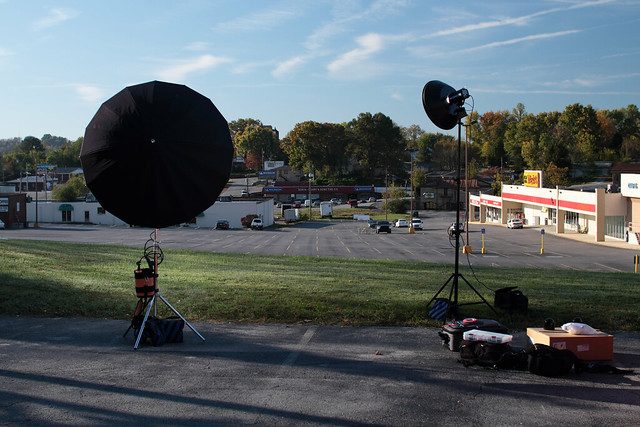Very nice set Sean! If I'd have to pick one, it would be #3, it has a very strong look. I like that.
I know how a polarizer affects the general natural light, but how does it affect your flashes? Does it even affect them?
Very nice set Sean! If I'd have to pick one, it would be #3, it has a very strong look. I like that.
I know how a polarizer affects the general natural light, but how does it affect your flashes? Does it even affect them?
Originally Posted by Jan Paalman
A circular polarizer does block a bit of light, effecting flash and ambient equally; so using it equates to having a .5 to 1.5 stop ND filter on the lens. Mine also imparts a bit of color shift to the scene, which can also be corrected in post or in camera (by adjusting white balance).
Oh ok. I guess you're not constantly turning the filter then? Or do you need to adjust white balance quite a few times?
I was more wondering that when you do, the flash lighting part may be differently affected by the polarizer than the general lighting is. I guess it can make some background look weird compared to the model? Or is the effect not great enough to have such an impact?
The main reason I'm asking is that light of your flash and ambient light have different directions and should therefor be differently affected?
I never used a polarizer and a flash at the same time, so I'm curious
Sean, you were using two strobe, with softboxes. At least, for most of the shots.
Could you have used the sun as the hair light? Or, would that have given it a different color balance on the right side of Sue (her left shoulder, hair)?
Originally Posted by Jan Paalman
As far as a polarizer affecting the flash illuminating the subject(other than the ND effect), I'm unsure. I've never set up a controlled experiment with the filter on and off to see the variation of light on the subject. My inclination is that there is little difference, other than the color shift and ND effect. I could be wrong, though.
Originally Posted by Alan
The sun was being used as a rim/hair light. It's visible on the subject's left shoulder (viewer's right side of the frame). The light from the sun is certainly warmer in color than the output coming from the flash. However, I was using a 1/4 CTO on the mainlight, but I left the fill ungelled. I was actually wanting there to be a certain color difference between the fill and main, just to add another dimension to the lighting (albiet, one that doesn't mimic natural lighting in any way).
That said, I ended up applying yet another layer of warming to the subject only on the sweeping sky images. I used a warming photo filter in photoshop and masked it so that it was only applied to the subject. I felt this helped balance out the subject with the warm-colored vegetation. After this shoot I realized that I desperately need to color calibrate my monitor so that I don't over-apply warmth to images (which I have done in the past on many occasions). I'm currentlyinvestigating solutions.
Originally Posted by Sean Setters
Sorry. It looks like a rim light. You did a good job of carefully placing her so that it cast a nice light on her hair and shoulders.
If it had been cloudy, would you have used a rim light, to compensate?
And, if it were cloudy, would you just use a flash for catch lights in the eyes, and nothing more than the catch lights?
I'm picking your brain a bit here, to find out what would work best on an overcast day.
Thanks.
Originally Posted by Alan
Possibly, but not always. I would have added it if I thought the scene would have been greatly helped by it. I didn't have my stripbox with me, so it would have meant using another softbox in the wind or else positioning a bare strobe very carefully.
Originally Posted by Alan
No, I would have used the lights to illuminate the subject, but at less power so as not to completely clash with the ambient.
Thanks for the explanation Sean
This weekend, a young lady wanted some shots taken to give to her husband this holiday season. Initially, she wanted bare trees and an overall "wintery" look for the images. However, she decided she wanted the pictures sooner rather than later, and asked for a more "urban" look. I suggested we shoot at a location I had used before, because I thought it would be a good combination of urban and landscape foliage. I also envisioned letting the sky play a dominate role in the photo.
The location was a high spot overlooking a Hobby Lobby / Dollar General Market shopping center. I shot from a low angle. In fact, I was laying on the ground with my camera about as close to the ground as I could get it. If I hadn't been that low, the framing would have included much of the parking lot (as you can see in the setup shot).
In the uncropped version, there's a little more of an urban look to the scene. However, I cropped out a billboard on the left, the Hobby Lobby building on the right, and cloned out one parking lot light for the version I posted to Flickr.
The lighting setup was 1 White Lightning x2400, camera right, 1/4 CTS gelled, diffused by a 22" Paul C. Buff HOBD (High Output Beauty Dish). 1 White Lightning Ultrazap 1600, camera left, diffused by a 64" Paul C. Buff PLM (Parabolic Light Modifier). Strobes triggered via Cybersyncs and Cyber Commander; powered via Vagabond II & Innovatronix Explorer XT. A CPL (circular polarizer) was used. Of course, a picture is worth 1000 words...
